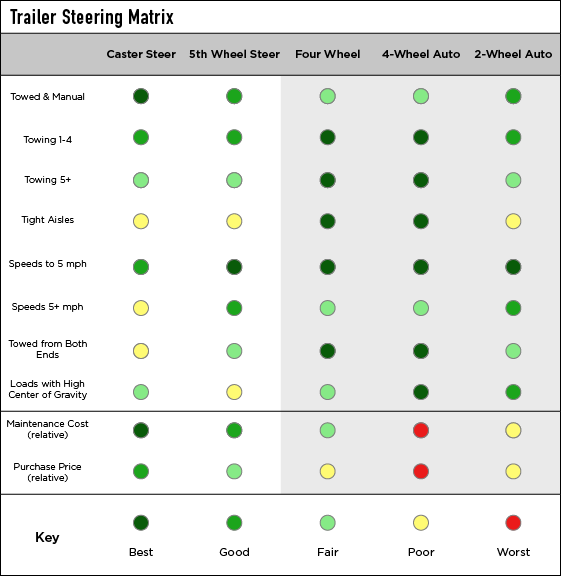You know that trailers come in all shapes and sizes. But you should also know that there are all types of steering options, too. The way your steering system operates can make or break any application. Good thing we’ve summarized everything you need to know below.
Type 1: Caster Steer trailers
- Design: Two swivel casters at one end, two fixed-load wheels or rigid casters at the other
- Good choice for its simplicity, and for an economical way to both power tow and push by hand
Type 2: Fifth Wheel Steer trailers
- Design: Single pivot point for the front axle/wheel assembly and fixed rear wheels (Think a kid’s little red wagon)
- Great for power towing, singularly or in trains
- Can be towed at higher speeds than Caster Steer trailers
- More economical than Four-wheel steer trailers
- Highly versatile
- Work great pulling solo
Type 3: Four Wheel Steer trailers
- Design: No fixed axles; both axles pivot for steering and are connected to each other by a tie rod
- Best bet for pulling longer trains of trailers through tight aisles and intersections, or anywhere aisle width space is at a premium
- Pricier than single Fifth Wheel Steer Trailers
Auto Steer trailers (general)
- Offer maximum stability
- Running gear stays fixed under load corners as you turn (as opposed to a Fifth-wheel steer where the entire axle assembly turns)
Two Wheel Auto Steer trailers
- Design: mimics an automobile
- Less expensive and easier to back up than Four-Wheel Auto
- Smart choice for maximum stability when towing solo
- Will track similar to a fifth wheel steer
Four Wheel Auto Steer trailers
- Design: front and rear steering like automobile, connected by a tie rod to coordinate tighter, more accurate turns
- Pricier than two-wheel auto steer due to more sophisticated turning engineering
- Best for towing long trains or when you need reversible towing*
- Will track similar to a non-auto four-wheel steer
Other good things to know
- Never “push” or put trains with more than one trailer in reverse. This can lead to structural damage.
- *Reversible towing means towing from either end (not backing up!)
